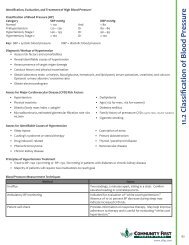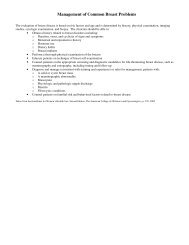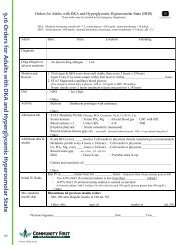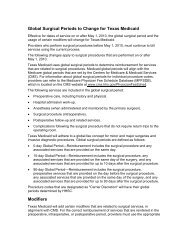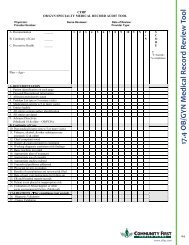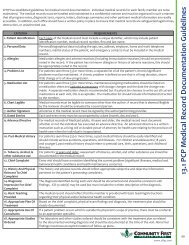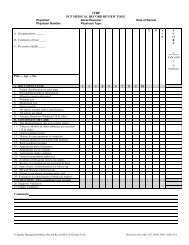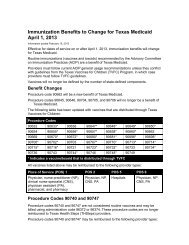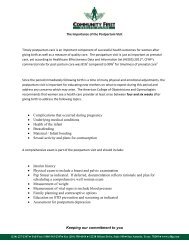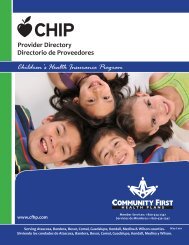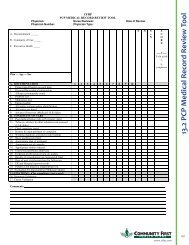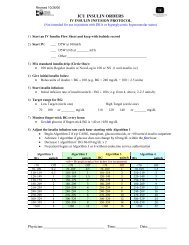Full Clinical Guidelines - Community First Health Plans.
Full Clinical Guidelines - Community First Health Plans.
Full Clinical Guidelines - Community First Health Plans.
Create successful ePaper yourself
Turn your PDF publications into a flip-book with our unique Google optimized e-Paper software.
II.<br />
Some hyperactive-impulsive or inattentive symptoms that caused impairment were present before age 7 years. However,<br />
at times inattentiveness specifically may not be noticed prior to age 7.<br />
III. Some impairment from the symptoms is present in two or more settings (eg., at school or work and at home).<br />
IV. There must be clear evidence of clinically significant impairment in social, academic, or occupational functioning.<br />
V. The symptoms do not occur exclusively during the course of a Pervasive Developmental Disorder, Schizophrenia, or other<br />
Psychotic Disorder and are not better accounted for by another mental disorder (eg., Mood Disorder, Anxiety Disorder,<br />
Dissociative Disorder, or a Personality Disorder).<br />
There are no known specific laboratory or other diagnostic tests that establish, confirm or rule out Attention-Deficit/<br />
Hyperactivity Disorder.<br />
The most accepted and effective ways of diagnosing ADHD are through:<br />
1. Reports from guardian; parents, grandparents, caretakers, spouses, other significant individuals.<br />
2. Reports from individuals from the school, day care, work place, and other physicians.<br />
3. <strong>Clinical</strong> interview<br />
4. Legal system; probation officer, court<br />
5. Physical examination to rule out physical causes for the symptoms<br />
The optimal approach/treatment for Attention-Deficit/Hyperactivity Disorder is a multiple-modality approach that combines<br />
psychosocial interventions and medical interventions.<br />
1. Psychosocial Interventions<br />
• Family-Focused Interventions<br />
• Parent education<br />
• Parent management training<br />
• Parent support groups ie. CHADD<br />
• Family Counseling<br />
• Child-Focused Intervention<br />
• Individual counseling<br />
• Social Skills training<br />
• School focused interventions (consultation with school personnel)<br />
2. Medications<br />
• Stimulants: Ritalin (LA), Adderall (XR), Dexedrine, Metadate (CD/ER), Focalin, Concerta,<br />
• Antidepressants: Imipramine, Wellbutrin, Effexor<br />
• Alpha 2 Agonist: Tenex, Clonidine<br />
• Selective norepinephrine reuptake inhibitor: Strattera<br />
When Attention-Deficit/Hyperactivity Disorder is Comorbid with other Disorders:<br />
1. Oppositional Defiant Disorder<br />
2. Conduct Disorder<br />
3. Depressive Disorders<br />
4. Bipolar Disorder<br />
5. Anxiety Disorders<br />
6. Learning Disorders<br />
7. Substance Abuse Disorders<br />
It is optimal to inform guardians that medication for ADHD does not usually impact those behaviors resulting from the above<br />
listed disorders. Treatment should include those listed for ADHD but may include more intense interventions.<br />
Psychological Testing is not utilized to diagnose ADHD, however, it may be indicated for ruling out other psychiatric disorders.<br />
Educational Testing is not indicated to diagnose ADHD, however, school resources should be utilized if educational testing is<br />
indicated for school placement.<br />
H EALTH PLANS<br />
www.cfhp.com<br />
29



